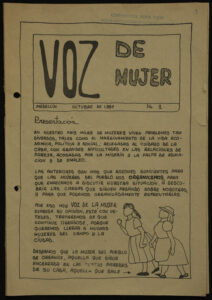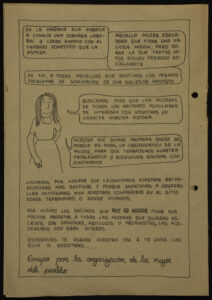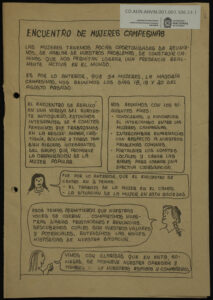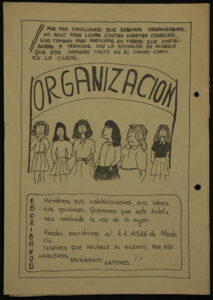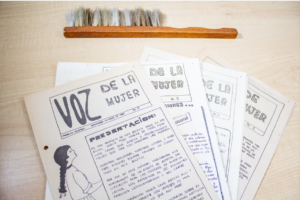Woman’s Voice No. 1
This document is the first issue of Voz de Mujer, a newsletter produced by the Grupo por la organización de la mujer del pueblo. It is a serialised publication that forms part of the Vamos Mujer – Movimiento Social de Mujer (AHVM-MSM) Historical Archive, kept in the Historical Sources Laboratory of the Faculty of Humanities and Economics at the National University of Colombia, Medellín. This archive was donated by Corporación Vamos Mujer to the university in 2021 and contains the Inactive Administrative Archive, Documentation Centre, Plans Library, Video, Home Video, Audio, Optical and Magnetic sections.
In the AHVM-MSM there are four issues of the bulletin that reflect the first steps of an organisational process promoted by activists belonging to the National Association of Peasant Users (ANUC), who promoted the setting up of women’s committees within the peasant movement. They organised meetings of peasant women and, for this reason, this bulletin includes a report on the one held between 18 and 20 August 1984.
Ever since the First Meeting of Peasant Women in Antioquia in 1979, the organisers felt the need to give voice to women’s concerns and to organisationally structure the demand for their specific rights within grassroots organisations. The 1970s and 1980s were a period of effervescence in which numerous and varied expressions of grassroots social movements demanded democratic reforms in response to decades of accumulated demands for social justice, participation and recognition.
These included the women’s social movement and the feminist movement, which gradually began to question the patriarchalism of trade union, social and political organisations, where women’s demands for autonomous organisation were often unwelcome as they were seen as a division of the class struggle. Women valued bringing democracy into everyday life or, as they said at the time, having “democracy in the street, at home and in bed”. They argued that, in addition to the oppression of the exploiting classes over the working class, there was the oppression of husbands and fathers in their families, which in many cases “hindered” their processes of struggle and organisation. This tension gave rise to debates on “dual militancy”, such as those discussed during the First Latin American and Caribbean Feminist Meeting, held in Bogotá, Colombia, in 1981, whose documents are also preserved in the AHVM-MSM.
Through this bulletin and others like it, using illustrations and short, simple texts, women from the working class sectors were invited to become aware of their reality, to organise themselves and to participate by sending in their opinions and proposals: “we have to fight against silence, so let’s speak, write, shout!
The successive editions of Voz de la Mujer published between 1985 and 1987 show that the group became autonomous as Corporación María Cano, in honour of the Colombian trade union leader, and later as Corporación Vamos Mujer por la Participación de la Mujer Popular, obtaining its legal status in 1987.
AUTHORS OF THE TEXT
Camila De los ríos Muñoz and Ruth López Oseira
BIBLIOGRAPHY
– Suaza Vargas, María Cristina. Soñé que soñaba: una crónica del movimiento feminista en Colombia de 1975 a 1982 (Spain: AECID, 2008).
NAME OF IBERARCHIVOS PROJECT
“Access, preservation and dissemination of the Vamos Mujer Historical Archive – Medellín Women’s Social Movement (Colombia)”.
Photographs:
Image caption:
1. Folio 1 recto of the serialised publication Voz de Mujer n° 1
2. Folio 1 verso of the serialised publication Voz de Mujer n° 1
3. Folio 2 recto of the serialised publication Voz de Mujer n° 1
4. Folio 2 verso of the serialised publication Voz de Mujer n° 1
5. Cleaning the digitised material with a soft bristle brush
from the AHVM-MSM

